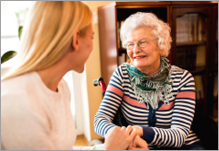Six concrete ways your visits help your aging loved one
 It’s understandable to feel apprehensive when it comes to visiting an aging loved one. Perhaps you’re uncomfortable with illness or aging, and you worry that your loved one will sense that. Maybe you’re concerned that you won’t know what to say or how to keep the conversation going. It can also be worrisome to emotionally prepare to see someone you love changed by age. All of these feelings are valid.
It’s understandable to feel apprehensive when it comes to visiting an aging loved one. Perhaps you’re uncomfortable with illness or aging, and you worry that your loved one will sense that. Maybe you’re concerned that you won’t know what to say or how to keep the conversation going. It can also be worrisome to emotionally prepare to see someone you love changed by age. All of these feelings are valid. It’s important to be honest with yourself about your concerns as you aim to work through them. Illness and aging are just another face of life’s many phases. Your loved one probably feels some of those same things that worry you. The stage of life that he or she is experiencing can be stressful, scary and lonely. Your visits can help your loved one tremendously; here’s how.
Creating anticipation:
There’s nothing like the thrill of putting a fun event up on your calendar and knowing that you have something to await. Anticipation is intoxicating. When you arrange a visit to see your aging loved one, you give that precious person a mutli-dimensional gift. He or she gets to feel that anticipation. The National Institute on Aging (NIA) explains how important this social connection can be: ”Social relationships are consistently associated with biomarkers of health.”
You may worry: I hope I say and do the right things while I’m there. By going to visit, you already are doing the right thing. Give your loved one a week’s notice so he or she can look forward to it. Then spend a little time thinking of old stories that connect you to your loved one. Stories about family traditions, food, old locations and characters tend to be conversation provoking; think of friends and family from the old neighborhood, the faith community, the school.
Bolstering memory:
Having a robust social experience is good for your aging loved one - both spiritually and physically. It may take a bit of finesse to learn to converse with those who struggle with Alzheimer’s or dementia, but often certain memories are clear and accessible to them. Find those pockets of clarity, and focus your conversation there.
Your loved one may not remember new developments, like the names of young children in the family, but he or she may clearly recall older details like the names of kids he or she knew in school. Just go with it.
Giving your loved one a social experience and the chance to share old stories and memories is good for his or her mind and soul. In fact, the American Journal of Public Health found that “elderly men and women with few social ties, poor social integration, and social disengagement were at greater risk of cognitive decline.” Engagement is vital to your loved one’s wellness, and your visits foster that.
Combating loneliness:
Loneliness hurts, and it can lead to issues like depression. When you visit your aging loved ones, you remind them that they matter. They are connected.
The NIA explains how vital this is: “Loneliness is a unique risk factor for symptoms of depression, and loneliness and depression have a synergistic adverse effect on well-being in middle-aged and older adults.”
Making the body stronger:
Interestingly, socializing is known to cause the body to be stronger and more resilient. It can even extend life spans. Dr. Angela Troyer explains: “Social engagement is associated with a stronger immune system, especially for older adults. This means that you are better able to fight off colds, the flu, and even some types of cancer.”
Improving perceptions of aging:
It can be tempting to shudder ourselves away from that which causes us discomfort. But we can’t do that with illness and aging. We must find our comfort zone with these inevitable realities of our human experience. It’s an important part of caring for our families and ourselves.
It takes an active effort, though, because we exist in a culture that doesn’t relish or welcome aging or illness. “[O]ur self-perceptions about aging are important predictors of physical and cognitive function in later life. If you are feeling cynical or dejected about getting older, it’s probably time for an attitude adjustment”, explains public health advocate Christopher Bergland. In other words, the attitudes you cultivate throughout your lifetime about aging may predict how you physically and psychologically weather it.
Forging connections:
Start doing this work now. Create room in your life for your aging loved one, and get to know what this process is like. It creates good karma for you, a good understanding of what aging is like, and the opportunity to know a loved one during an important phase in his or her lifetime. This is a special time during which to create a connection. Embrace the opportunity. It stands to serve both you and your loved one well.
